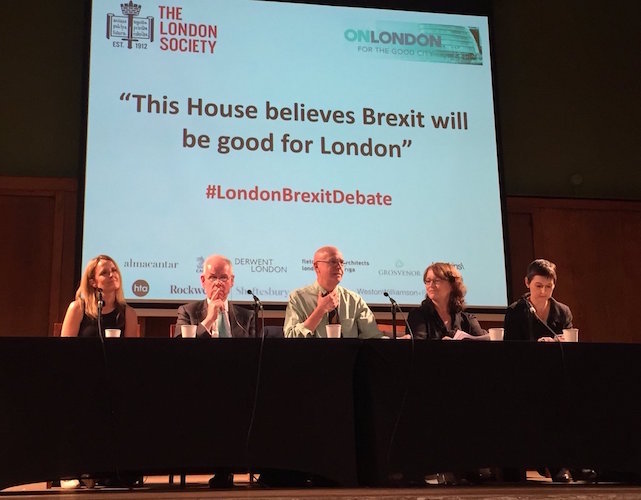Brexit will be good for London. It’s far from the majority view in a city that voted 60% Remain, but the 40% case still deserves a fair hearing. And with Brexit in some shape or form still on the national schedule, the 60% need to be thinking about how the capital is going to deal with that outcome, however much they dread it. That was the thinking behind the format for last night’s London Brexit debate, organised by On London and the London Society and held before audience of nearly 200 people in the famous Conway Hall in Red Lion Square.
A disappointment was that Andrew Adonis, that tireless anti-Brexit campaigner, was unable in the end to be one of the four speakers – he got stranded at Hamburg airport due to a flight delay. However, Sara John from Best For Britain very kindly stepped in to substitute for him. She, her fellow Remainer Caroline Pidgeon and the two Leavers who spoke in favour of the motion, Victoria Hewson and Daniel Moylan, made excellent speeches and took a wide range of questions from the audience.
Remainers heavily outnumbered Leavers on the floor of the hall, and the formal motion was resoundingly defeated. However, the Leavers made their voices heard. And though some of the usual heat around Brexit was generated, a little light was also shed on the possible challenges or opportunities – depending on your point of you – that London might be presented with as a result of it. A few points made by each of the four speakers:
- Opening the proceedings, Victoria Hewson, a lawyer with the Institute of Economic Affairs, said that the wider debate opened up by the EU referendum and its outcome has broken the “crazy consensus” around issues such as trade, immigration and our constitution and rejuvenated politics. Recalling a recent walk in polluted south London air, she argued that the EU has played “a disgraceful role” in the diesel emissions scandal and that being free of it will enable London to make much faster strides towards improving air quality. Here was an everyday example of why returning powers to UK government institutions at all levels would be of benefit. Similarly, London’s famous vitality, creativity and productivity could only be enhanced by the frameworks in which its businesses operate being set domestically.
- In opposition to the motion, Sara John, also a lawyer, with long experience in the music industry and government before joining Best For Britain, said that increasing numbers of Londoners oppose Brexit, accused Boris Johnson of changing his stance on Europe, and claimed that “the facts show we have all benefited from EU membership”. Citing figures compiled for a new app Best For Britain helped finance, she said that even strongly pro-Leave Havering had received large sums from the EU. Londoners in the city’s thriving creative industries “are struggling to understand how cutting ourselves off from our friends and neighbours in Europe will help us to become more global.” Londoners believe in a world of “communication, collaboration and celebration of difference,” she said, and this was under threat.
- Daniel Moylan, the second speaker in favour of the motion, responded by saying that every pound spent in the UK by the EU had cost us £1.70 in the first place and expressed the firm belief that a second referendum or “people’s vote” will not happen. He reminded us that a referendum in London in 1998 had produced the Greater London Authority and London mayoralty, a change that has proved “a huge success” and expressed Londoners’ wish to have “decisions made as close to them as possible and under their control”. It goes against this principle, he argued, that London cannot govern the quality of water in the Thames or require lorries to be made less dangerous to cyclists without the say so of Brussels, and illogical to say that devolution to London is good but that aspects of its laws should be set so as to also be applicable to “the more pastoral borders of Transylvania.” Daniel has published his speech in full here.
- The final speaker, opposing the motion, was Caroline Pidgeon, a self-described “passionate Remainer” who, while readily accepting that the EU is not perfect, is sure it would be “foolish to leave”. She said its benefits are “already trickling away from London”, listing major companies “that have already decided to expand operations in other European cities at the expense of London” with “even Lloyds of London moving jobs out of the capital.” No longer having access to the European Investment Bank would hit investment in a range of infrastructure projects she said, pointing out that transport schemes in London under Boris Johnson had received funding from it. “London will be a far less safe place,” after Brexit she maintained, due to the capacity of the Met to share information with police services in EU being impaired and the loss of the European arrest warrant.
Audience members who asked testing questions included businessman, Labour donor and longtime eurosceptic John Mills, Martin Hoscik who runs the eminent Mayorwatch website, Haringey Labour Party member Gareth Morgan and Leavers of London founder Lucy Harris. Juniper TV, who make the London strand of the BBC’s Sunday Politics show, filmed the proceedings and interviewed some of the speakers.
Many more interesting points were made and exchanged than I can record today, but I will do my best to draw more of them to your attention in the coming weeks. Thank you again to all four speakers, to the excellent audience and to the London Society for being such a pleasure to work with.
Photograph from Cascade Communications, who were also present at the event.

